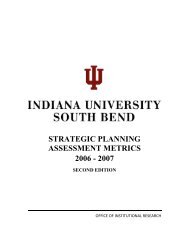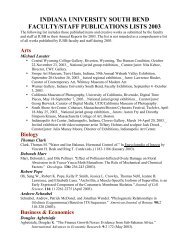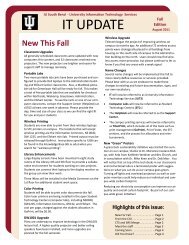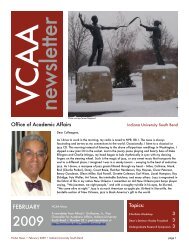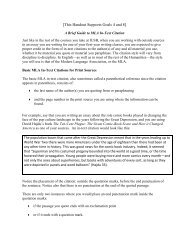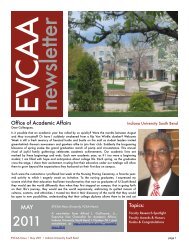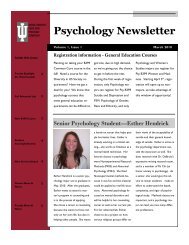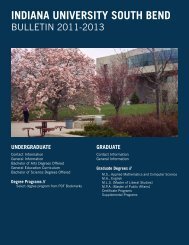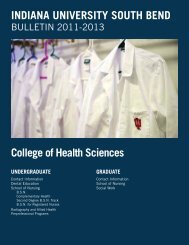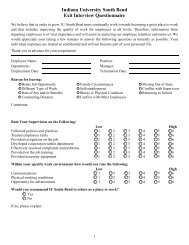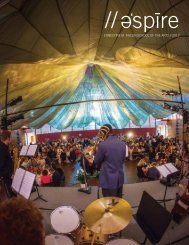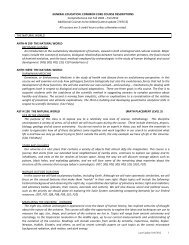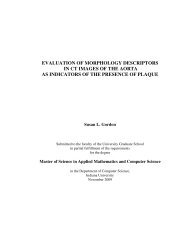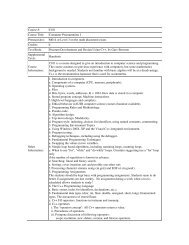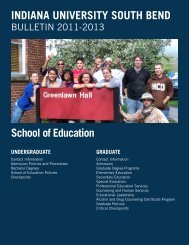Current version - Indiana University South Bend
Current version - Indiana University South Bend
Current version - Indiana University South Bend
Create successful ePaper yourself
Turn your PDF publications into a flip-book with our unique Google optimized e-Paper software.
2763 IU SOUTH BEND COURSE DESCRIPTIONS<br />
BIOL-L 311 Genetics (3-5 cr.)<br />
P: BIOL-L 101, BIOL-L 102, BIOL-L 211,<br />
CHEM-C 105, CHEM-C 106. Lectures on<br />
the principles of heredity at the molecular,<br />
cellular, individual, and population levels.<br />
II<br />
BIOL-L 312 Cell Biology (3-4 cr.)<br />
P: BIOL-L 211, CHEM-C 106. <strong>Current</strong><br />
views of the structure and function of<br />
cellular organelles and components, with<br />
emphasis on the flow of information<br />
through the cell, the metabolism<br />
that supports cellular functions, and<br />
differences among specialized cells. II<br />
BIOL-L 313 CELL BIOLOGY LABORATORY (3 CR.)<br />
P: L312. Theory and techniques of<br />
experimental cell biology. I (odd years)<br />
BIOL-L 317 Developmental Biology (3-4 cr.)<br />
P: BIOL-L 211. R: BIOL-L 312. Analysis of<br />
developmental processes that lead to the<br />
construction of whole organisms from<br />
single cells. Includes the principles of<br />
embryology and molecular mechanisms<br />
of development. II (odd years)<br />
BIOL-L 318 Evolution (3-5 cr.)<br />
P: BIOL-L 311. Provides a rigorous<br />
exploration of the theory of evolution—the<br />
conceptual core of biology. Topics include<br />
origins and history of life; interplay of<br />
heredity and environment in shaping<br />
adaptations; molecular, behavioral, and<br />
social evolution; patterns of speciation,<br />
extinction, and their consequences;<br />
methods of inferring evolutionary<br />
relationships among organisms. II (even<br />
years)<br />
BIOL-L 321 PRINCIPLES OF IMMUNOLOGY (3 CR.)<br />
P: BIO-L 211. R: BIO-L 311, BIO-L 312.<br />
An introductory survey of the basic<br />
principles of immunology and their<br />
practical applications. I (even years)<br />
BIOL-L 323 molecular biology laboratory (3 cr.)<br />
P: BIOL-L 211. Manipulation and analysis<br />
of genes and gene products. Gene<br />
amplification, cloning, <strong>South</strong>ern blots<br />
and DNA sequence analysis. Column<br />
chromatography and gel electrophoresis<br />
of nucleic acids and proteins. II<br />
BIOL-L 342 TROPICAL MARINE BIOLOGY FIELD<br />
COURSE (3 cr.)<br />
P: BIOL-L 304. Tropical marine ecosystems<br />
will be examined in detail during a 10 day<br />
trip to field sites in the Caribbean or Central<br />
America. S (even years)<br />
BIOL-L 391 Special Topics in Biology (1-3 cr.)<br />
P: BIOL-L 101, BIOL-L 102 or equivalent.<br />
A detailed examination of an area within<br />
biology. Topics vary. May be repeated for<br />
credit with different topics/titles.<br />
BIOL-L 403 Biology Seminar (1-3 cr.)<br />
P: Senior standing, with major in biology.<br />
Individual presentations on topics of<br />
current importance. II<br />
BIOL-L 434 MARINE COMMUNITY ECOLOGY (3 cr.)<br />
P: One year of college biology and<br />
graduate student status. C: BIOL-L 509<br />
required. Survey of physical and chemical<br />
oceanography and marine environments<br />
and communities. Credit allowed for only<br />
one of BIOL-L 304 or BIOL-L 434.<br />
BIOL-L 473 Ecology (3-4 cr.)<br />
P: BIOL-L 101, BIOL-L 102, CHEM-C<br />
106, 6 credit hours of upper-level, majors<br />
biology. Distribution and abundance<br />
of animals and plants, interactions of<br />
organisms, and the environment at<br />
levels of individual, population, and<br />
community. I (odd years)<br />
BIOL-L 474 field and laboratory ecology (2 cr.)<br />
P or C: BIOL-L 473. Field and laboratory<br />
study of populations, communities, and<br />
ecosystem components through observation<br />
and measurement. I (odd years)<br />
BIOL-L 490 Individual Study (1-12 cr.)<br />
P: Written permission of faculty member<br />
supervising research is required. A written<br />
report must be completed as evidence<br />
of each semester’s work. Student must<br />
present an oral report to receive more<br />
than 3 credit hours. I, II, S<br />
BIOL-L 509 FIELD EXERCISES FOR BIOLOGY<br />
EDUCATION (1-5 cr.)<br />
P: Graduate student status. C: BIOL-L 434<br />
required. BIOL-L 509 is a graduate course<br />
for students in biology and education with<br />
an intended, or current, career in biology<br />
education. Students will collect data and<br />
design field exercises while at the Belize<br />
Marine TREC laboratory on organismal<br />
biology and ecology appropriate for<br />
lesson plans in public schools.<br />
BIOL-M 430<br />
virology LECTURE (3 cr.)<br />
P: BIOL-L 211. R: BIOL-L 311, BIOL-L<br />
312. Viruses of plants, animals (including<br />
humans), and bacteria; emphasis on<br />
molecular biology of viral systems.<br />
Viruses and human disease such as cancer<br />
and AIDS; viruses and their evolution. I<br />
(odd years)<br />
P = Prerequisite, R = Recommended, C = Concomitant, VT = Variable Title<br />
I = fall semester, II = spring semester, S = summer session(s)



